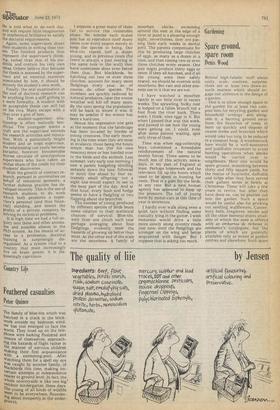Science
Abuses of the student
'Bernard Dixon
There have been official and unofficial reports aplenty in recent years on all aspects of higher education. Except one. The research training received by apprentice scientists, leading to the doctorate of philosophy (PhD), has been largely neglected, like so many British anachronisms, on the dubious premise that' it works '. Yet the PhD system is shot through with anomalies and frustrations.
There are, for example, no standard entry qualifications; they vary from one university department to another. Some universities, moreover, have established a master's degree (MSc) as an intermediate stage towards the doctorate. Some haven't. Some make this obligatory for graduates with anything other than a first class bachelor's degree. Others don't.
To an alarming extent, the PhD student's fate depend s on one man — his supervisor — whose personal quirks can affect profoundly the trainee scientist's future career. In particular, the way a student's work is guided varies enormously between one university department and another. In line with the German origins of the doctorate is the leisurely practise where a student becomes apprenticed to a great man, works under his tutelage, and hopes that some of the , greatness rubs off. Such students tend to receive brilliant guidance, but to receive it infrequently. They are handed a research problem and are expected to produce a solution — whether it takes the ' regulation ' time (usually three years), or less, or a good deal longer. Some supervisors, however, interpret PhD training simply as an introduction to research methods — a means of learning how to plan and carry out experiments and interpret the results. If, at the end of the agreed period, a stu dent has developed the necessary abilities, and can discuss his work intelligently, then he should re ceive the degree — whether or not he has solved his original problem.
A variation is the all-too-common situation in which a student is blatantly exploited as a 'pair of hands ', doing tedious, repetitive work which could well be given to unqualified laboratory assistants.
He is told what to do each day, and will require little imagination or intellectual brilliance to satisfy the doctoral requirements.
Again, some supervisors direct their students in writing their theses. The finished products thus represent the supervisor's thinking, rather than that of his students, and contain his very own Ideas . Others believe that because the thesis is assessed by the supervisor and an external examiner nominated by him, it should be entirely the student's own work.
Finally, the oral examination at the end of doctoral research can be anything from a stiff grilling to a mere formality. A student with an acceptable thesis can still fail on his viva. Many escape with a Chat over a pint of beer. The student-supervisor relationship is often mutually ben eficial. The youngster learns a craft and the supervisor extends his research activities and reputa tion. With a particularly bright student and an inept supervisor, the relationship can easily become Parasitic, however. Innumerable stories circulate of unscrupulous supervisors who have taken an undue share of the credit for their students' discoveries.
With the growth of contract research, pursued in universities on behalf of industrial sponsors, a further dubious practise has developed recently. This is the use of research students to do work Which both promotes a supervisor's personal (and thus finan cial) standing, and boosts the Profits of a private company by solving its technical problems. It is high time we had a full enquiry into these and other anoma lies and possible abuses in the PhD system. As the means of access to a profession, doctoral training is surprisingly disorganised. As a system vital to a Country that must increasingly live on brain power, it is disquietingly capricious.



































 Previous page
Previous page